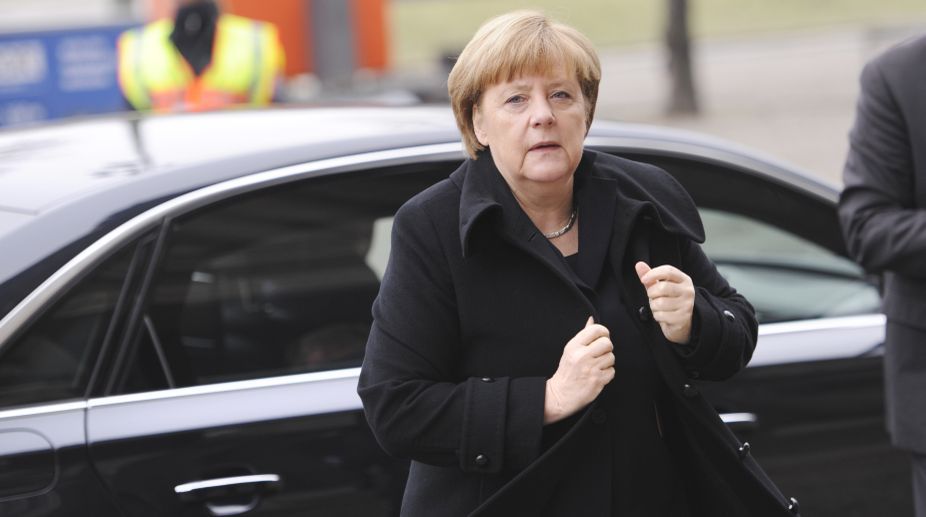German Chancellor Olaf Scholz arrives in Delhi for G20 Summit
Schloz was received by Union Minister of State for MSME, Bhanu Pratap Singh Verma at the airport.

German Chancellor Angela Merkel (Photo: AFP)
On Sunday Germany will elect a new Chancellor. But in a fashion quite unlike the loud and long Indian election or the controversial US election last year, German elections are quiet. Chancellor Angela Merkel is expected to win a fourth term prompting some journalists to label this a “boring” election. However, “boring” seems far from the truth, as Sunday’s result will determine the fate of the European Union along with the continuation of existing policies. A more fitting term is perhaps a “comfort election”.
The key issues facing all political parties are migration, Dieselgate, Germany’s militarisation and the new and active role it sees for itself abroad, terrorism, demographic trouble, polarisation of the labour force and the EU crisis. Parties differ on these issues and their stance will largely determine the result of the election. A strong Alternative for Germany (AfD) will be Angela Merkel’s biggest threat.
For the first time after World War II, Germany has witnessed the rise of a far-right political party. If they win over five per cent of the vote, they will enter the Bundestag for the first time and may even become the leading opposition party. If opinion polls are to be believed, the AfD is likely to win 12 per cent of the vote, or 50 seats. If this happens, one can expect a drastic change in Germany’s migration policy, a ban on asylum seekers and a discontinuation of the Euro.
Advertisement
The liberal Free Democratic Party (FDP) has risen from the ashes. The party has young, new leaders with only twenty faces from the old guard. It ran a largely professional campaign, and their #DenkenWirNeu (#WeThinkNew) media drive has been successful. On the one hand, they are probusiness and want to make Germany more foreign-investment friendly, which will help the country in keeping up its high prosperity rate. On the other hand, they are keen that Germany stops bailing out struggling EU economies like Greece.
Despite the media and some Germans saying the election is more or less decided, Angela Merkel will probably need to cobble a coalition government. A Grand Coalition is highly unlikely – after all, does Germany want to see its two biggest parties form a coalition once again? In election spirit citizens generally want to know, “what more can you offer?” which the Social Democratic Party (SDU) and Christian Democratic Party (CDU) have not been able to successfully answer. Martin Schulz of the SDU could have been Merkel’s strongest opponent.
Yet it is rather awkward for him to criticise the very party SDU has been in a coalition with. For some Germans, the SDU and the CDU are now seen as one. A Jamaican Coalition (derived from the party’s colours corresponding with the colours of the Jamaican flag) is a more likely but tricky option. Analysts predict the Green Party, FDP and CDU will form this threeparty coalition. The Green party is unlikely to disturb the CDU and FDP pro-business plans and generally ‘go with the flow’. However, a Jamaican coalition has never formed the national government before and it will be interesting to see the role of the Green Party in steering policies toward the left especially in education, civil rights and environmentalism.
Nevertheless, a coalition of this kind will bring fresh air to Merkel’s government. If opinion polls are correct and Merkel does win a fourth term, she will be valuable for a strong EU. However, Germany will no longer be able to take a stand for a strong EU alone and will need the help of France’s Macron.
Britain will be missed for it was like Germany in its market-oriented approach. Nevertheless, Merkel is and will remain a beacon of stability in the eyes of Germans and the world. She certainly does not look tired and has a long and successful record to show. H
er shift away from nuclear energy has been praised by political parties across the spectrum and yet she remained silent on Dieselgate until a few weeks ago. From an Indian perspective, clear vocal support on terrorism, renewable energy and the IndiaEU Free Trade Agreement will be expected.
Also of interest will be Germany’s position on China’s One Belt One Road (OBOR). The election is being keenly observed by the EU, UK, USA and India’s Foreign Office mandarins for it will have bearings on each of their relationships. This is anything but a boring election.
(The writer is associated with the Observer Research Foundation.)
Advertisement